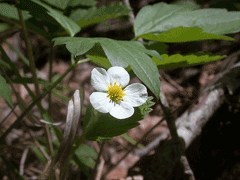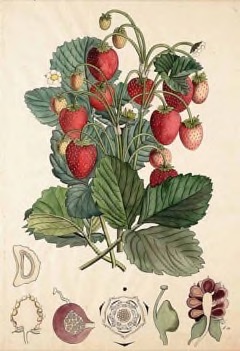 |
|
http://flickr.com/photos/11158528%40N08 |
 |
|
Translate this page:
Summary
Physical Characteristics

 Fragaria vesca is a PERENNIAL growing to 0.3 m (1ft).
Fragaria vesca is a PERENNIAL growing to 0.3 m (1ft).
It is not frost tender. It is in flower from April to May, and the seeds ripen from June to July. The species is hermaphrodite (has both male and female organs) and is pollinated by Insects.
Suitable for: light (sandy), medium (loamy) and heavy (clay) soils and prefers well-drained soil. Suitable pH: mildly acid, neutral and basic (mildly alkaline) soils. It can grow in semi-shade (light woodland) or no shade. It prefers moist soil.
UK Hardiness Map
US Hardiness Map
Synonyms
Fragaria vesca californica. (Cham.&Schldl.)Staudt.
Plant Habitats
Woodland Garden Sunny Edge; Dappled Shade; Shady Edge;
Edible Uses
Edible Parts: Fruit Leaves
Edible Uses: Coffee Tea
Fruit - raw[105, 161, 257]. Aromatic, sweet and succulent[183]. The fruit can also be dried for later use[177, 183]. The fruit is about 15mm in diameter[200]. The fresh or dried leaves are used to brew an excellent tea[183].
References More on Edible Uses
Medicinal Uses
References More on Medicinal Uses
The Bookshop: Edible Plant Books
Our Latest books on Perennial Plants For Food Forests and Permaculture Gardens in paperback or digital formats.

Edible Tropical Plants
Food Forest Plants for Hotter Conditions: 250+ Plants For Tropical Food Forests & Permaculture Gardens.
More

Edible Temperate Plants
Plants for Your Food Forest: 500 Plants for Temperate Food Forests & Permaculture Gardens.
More

More Books
PFAF have eight books available in paperback and digital formats. Browse the shop for more information.
Shop Now
Other Uses
References More on Other Uses
Cultivation details
Prefers a fertile, well-drained, moisture retentive soil in a sunny position[200]. Tolerates semi-shade though fruit production will be reduced. A vigorous plant, spreading rapidly by means of runners. It flowers freely with us, but has not set fruit on our Cornwall trial ground as yet, possibly because all our plants are one clone[K].
References Carbon Farming Information and Carbon Sequestration Information
Temperature Converter
Type a value in the Celsius field to convert the value to Fahrenheit:
Fahrenheit:
The PFAF Bookshop
Plants For A Future have a number of books available in paperback and digital form. Book titles include Edible Plants, Edible Perennials, Edible Trees,Edible Shrubs, Woodland Gardening, and Temperate Food Forest Plants. Our new book is Food Forest Plants For Hotter Conditions (Tropical and Sub-Tropical).
Shop Now
Plant Propagation
Seed - sow early spring in a greenhouse. The seed can take 4 weeks or more to germinate. The seedlings are very small and slow-growing at first, but then grow rapidly. Prick them out into individual pots when they are large enough to handle and plant them out during the summer. Division of runners, preferably done in July/August in order to allow the plants to become established for the following years crop[200]. They can also be moved in the following spring if required, though should not then be allowed to fruit in their first year. The runners can be planted out direct into their permanent positions.
Other Names
If available other names are mentioned here
Native Range
NORTHERN AMERICA: United States, Oregon (southwest), California, Mexico, Baja California (Norte), Baja California Sur,
Weed Potential
Right plant wrong place. We are currently updating this section.
Please note that a plant may be invasive in one area but may not in your area so it’s worth checking.
Conservation Status
IUCN Red List of Threatened Plants Status :

Growth: S = slow M = medium F = fast. Soil: L = light (sandy) M = medium H = heavy (clay). pH: A = acid N = neutral B = basic (alkaline). Shade: F = full shade S = semi-shade N = no shade. Moisture: D = dry M = Moist We = wet Wa = water.
Expert comment
Author
Cham.&Schltdl.
Botanical References
71200
Links / References
For a list of references used on this page please go here
Readers comment
| Add a comment |
|
If you have important information about this plant that may help other users please add a comment or link below. Only comments or links that are felt to be directly relevant to a plant will be included. If you think a comment/link or information contained on this page is inaccurate or misleading we would welcome your feedback at [email protected]. If you have questions about a plant please use the Forum on this website as we do not have the resources to answer questions ourselves.
* Please note: the comments by website users are not necessarily those held by PFAF and may give misleading or inaccurate information.
To leave a comment please Register or login here All comments need to be approved so will not appear immediately.
|
|